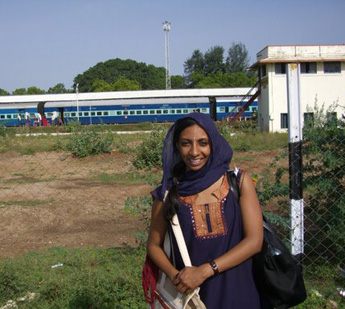
Nithya Krishnan has taken it upon herself to focus students' attention on social justice issues beyond campus.
"At Northwestern the consequences of the Iraq occupation, for instance, are not really tangible because it's not a daily reality," she says. "Students are sometimes divorced from things that are occurring outside the University."
Throughout her four years at Northwestern the former president of Campus Greens/Activists has brought social justice issues to the forefront. Two years ago Krishnan organized a solidarity campaign to show that the student body condemned the U.S. war in Iraq.
"The point of the campaign was to show that Northwestern opposes the invasion of a sovereign state and to call for immediate removal of troops," says Krishnan, an anthropology and biology double major. "We did a poll at the Rock, where we had students record whether they were for or against the war in Iraq and if they supported our call for bringing our troops home." Five hundred students participated in the poll, and only 30 supported the war and opposed bringing the troops home.
"I feel the war in Iraq is one of the most important events of our lifetime," says Krishnan, of Fort Myers, Fla. "Our troops, their families and the Iraqis are facing the repercussions on a daily basis."
A frequent participant in Chicago-area protests, Krishnan worked with the Chicago Coalition Against War and Racism to help plan the March Against Iraq War, held March 14 in Chicago's Pilsen neighborhood to mark the sixth anniversary of the U.S. invasion of Iraq.
Even beyond U.S. borders, Krishnan has been motivated to activism. When she traveled to Cape Town, South Africa, for an independent internship for her global health studies, her position changed from outsider to activist within days.
She interned with the Treatment Action Campaign, an organization focusing on HIV/AIDS treatment and social justice. At first Krishnan wrote for Treatment Action Campaign's magazine, Equal Treatment, but then riots erupted in Johannesburg.
"A lot of people from other African countries who live in South Africa were discriminated against because South Africans thought they were taking their jobs," Krishnan says. "Violence started breaking out."
Soon the unrest spread to Cape Town. Krishnan says around 20,000 Africans were displaced from their homes.
"The Treatment Action Campaign was the front line of the civil society response," Krishnan says. "We started finding shelters for people, as well as food, clothing, blankets — basically taking care of everything that the government should have been doing. We would work from 8 a.m. to 2 a.m. every day for the first few weeks, just trying to help people reintegrate back into the communities or get repatriation back to their country of origin."
Krishnan also traveled to India's Tamil Nadu state to do research for her senior thesis on urbanization and nutrition transition in South India. Krishnan, whose parents are from the region, studied a rural area, a semiurban area and an urban area in India to see the impact of urbanization on people's health.
With her dedication to social justice, Krishnan isn't focused on finding a particular career path yet.
"I'm not really rushing to hurry up and stand still," Krishnan says. She hopes to go to graduate school to study anthropology or public health.
In the meantime, she's enjoying the unpredictability. "What I've come to learn in the past four years is that no matter what I want to do, what's just as important is the means of getting there," Krishnan says. "I'm really looking forward to where my life takes me, and I don't necessarily have a direction, but I think that is the direction."
— Elizabeth Weingarten (J10) |
